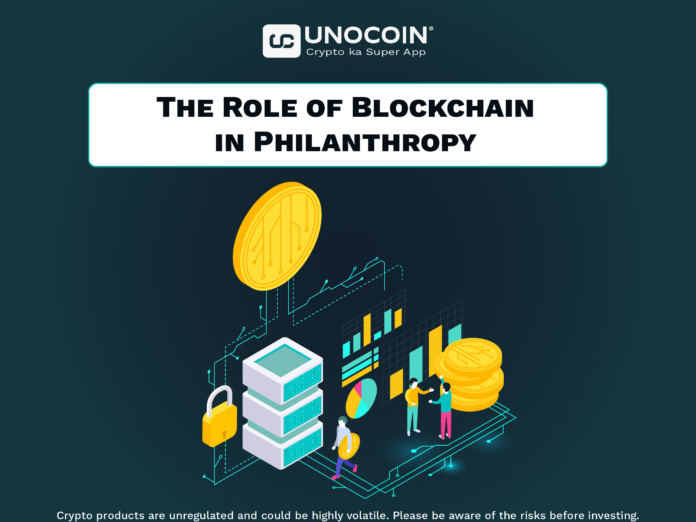Blockchain for Good: Transforming Philanthropy Through Transparency, Efficiency and Impact
In the field of philanthropy, the integration of blockchain technology has ushered in a new era of transparency, efficiency and increased impact. Originally designed as the decentralized ledger technology that underpins cryptocurrencies, blockchain has found a natural fit in philanthropy by addressing long-standing issues such as accountability, traceability of funds, and inclusivity. This survey delves into the ways blockchain is reshaping philanthropy and creating a more accountable, efficient and impactful ecosystem for social good.
Transparency through immutable ledgers:
At the heart of blockchain’s impact on philanthropy is its ability to create transparent and immutable ledgers. Every donation, transaction, and allocation of funds is recorded on the blockchain, creating an auditable trail that can be accessed by donors, recipients, and stakeholders. This transparency builds trust in the philanthropic sector as donors can track the journey of their contributions and ensure they have a tangible impact.
Smart Contracts Simplifying Processes:
Blockchain smart contracts automate and streamline philanthropic processes, reduce administrative overhead, and ensure that a greater percentage of funds go directly to the intended beneficiaries. Smart contracts that trigger automatically when pre-defined conditions are met facilitate seamless transactions, enforce agreements and enable real-time impact tracking, increasing the effectiveness of philanthropic efforts.
Decentralized distribution of aid in response to a crisis:
In times of crisis or emergency, the decentralized nature of blockchain is used to efficiently distribute aid. By leveraging blockchain, organizations can create transparent systems to track and deliver aid directly to affected areas. This decentralized approach minimizes bureaucratic hurdles, reduces the risk of corruption and ensures that aid reaches those in need quickly and efficiently.
Impact Tokenization:
Blockchain introduces the concept of tokenization to philanthropy, making it possible to create digital tokens representing specific social or environmental outcomes. Donors can invest in these tokens to provide a more detailed understanding of the impact of their contributions. This tokenized approach links donations to measurable results and fosters a results-driven philanthropic environment.
Global Donation Without Borders:
Blockchain-powered cryptocurrencies facilitate borderless transactions and enable individuals around the world to engage in philanthropy on a global scale. This inclusivity breaks down geographical barriers and allows people regardless of their location to contribute to causes that resonate with them. The democratization of global giving through blockchain expands the reach of philanthropy and fosters a collective approach to solving global challenges.
Empowering accountability through digital identities:
Blockchain’s ability to securely manage digital identities plays a key role in strengthening accountability within philanthropy. It ensures that aid and resources are directed to the intended beneficiaries, reducing the risk of fraud. By providing a decentralized and tamper-proof identity verification system, blockchain protects the integrity of philanthropic efforts.
Community-led philanthropy with The DAO:
Decentralized Autonomous Organizations (DAOs) built on the blockchain enable community-led philanthropy. These organizations operate based on smart contracts that allow community members to collectively make decisions about the allocation of funds and charitable initiatives. This decentralized decision-making allows individuals to have a direct impact on philanthropic efforts, fostering a sense of ownership and community social change.
Challenges and future considerations:
While blockchain holds immense promise for reshaping philanthropy, challenges such as regulatory uncertainties, scalability, and the need for user education need to be addressed. Achieving a balance between innovation and compliance is critical to ensuring the continued growth and positive impact of blockchain in the philanthropic sector.
Conclusion:
Blockchain for good is not just a slogan; means a revolutionary shift in philanthropy towards a more transparent, efficient and effective model. As blockchain technology continues to evolve, its potential to reshape the donation landscape for the better is increasingly evident. In this blockchain-powered era of philanthropy, the ethos of social good is amplified, promising a future where philanthropy is not just an act of generosity, but a catalyst for lasting positive change.
Please find the list of authentic Unocoin accounts for all your queries below:
- YouTube Channel: https://www.youtube.com/c/Unocoin/videos
- Newsletter: https://medium.com/subscribe/@Unocoin_growth
- Blogs: https://blog.unocoin.com
- Instagram: https://www.instagram.com/unocoin/
- Twitter: https://twitter.com/Unocoin
- Facebook: https://www.facebook.com/unocoin/
- LinkedIn: https://in.linkedin.com/company/unocoin
- Telegram Group: https://t.me/Unocoin_Group
- Telegram Channel: https://t.me/+fasQhTKBsfA5N2Zl
- Telegram: https://t.me/UnocoinSupport_Bot
- E-mail id: [email protected]
- Contact details: 7788978910 (09:30 AM IST – 06:30 PM, Mon – Sat)
- App store link: https://apps.apple.com/us/app/unocoin/id1030422972?ls=1
- Playstore link: https://play.google.com/store/apps/details?id=com.unocoin.unocoinwallet
Disclaimer: Crypto products are unregulated as of this date in India. They could be highly volatile. At Unocoin, we understand that there is a need to protect consumer interests as this form of trading and investment has risks that consumers may not be aware of. To ensure that consumers who deal in crypto products are not misled, they are advised to DYOR (Do Your Own Research).




